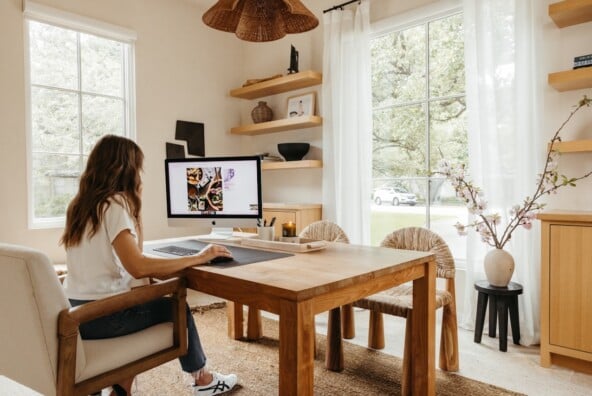Forget teenage angst, goodbye dreaded 30 — the quarter-life crisis is here and it’s so, so real.
Although I remember having this exact thought when I was 25, I also remember feeling alone in thinking that this feeling was just affecting me while the majority of the population had it together. But then I was talking about the quarter-life crisis with Career Contessa’s new editorial assistant, Jacq McElhone, and we bonded over this since she’s 22 and, well, realizing she’s already lived through about a quarter her life. This sent us down the rabbit hole of research and Jacq’s take on it might surprise you — or might make you feel better since you’re definitely not alone. Here’s Jacq to explain more:
My realization that I was a quarter into my life set off a ripple effect of deeply reflective, soul-searching questions: What have I done of value? What am I going to do? What do I want to do? What is my career? Do I even have goals? What are my strengths? How will I define myself as my own person who contributes to the world at large?

The quarter-life crisis is real
Lucky for me (I think?), it seems I’m not alone in facing a potential “quarter-life crisis.” (That’s right, I’m talking to you, millennials.) 75 percent of people ages 25-33 have had a quarter-life crisis, according to a study conducted by LinkedIn.
59 percent of those surveyed reported feeling unsure about what to do next in their careers and lives. 49 percent said they aren’t earning enough. And another 44 percent reported that they’re just “stuck in a rut.”
All that pressure to succeed, planning for the future, making money to support yourself, but also having a job that you’re “passionate” about and fulfills you somehow, while at the same time finding a significant other and maintaining all of your wonderful, flourishing friendships? Yeah.
Those expectations that we have for ourselves (and our peers, if we’re being honest) can lead to some pretty massive let-downs when we realize that it may actually be impossible to do all of those things — or at least do them well. And don’t even get us started on the anxiety that seems to come hand-in-hand with trying to “do it all,” anyway.
It’s not really surprising that almost a quarter of the respondents also reported taking a career break altogether, taking time off to sit down and really figure out what’s next.

The causes of crisis
LinkedIn found that most of this anxiety we feel comes from two major factors:
1) finding a job we’re passionate about and
2) comparing ourselves to friends.
While these concerns cause plenty of insecurity for everyone, they affect women even more deeply. Over 50 percent of the women in the study reported feeling anxious, compared to only 41 percent of men.
The anxiety caused by uncertainty about your job makes sense. We are groomed to go to school until we’re 22, then expected to (quickly) find a job that makes us great money while also making us feel passionate and happy in addition to giving us plenty of time to travel the world, push out some children, all that jazz. The reality is that that’s not doable for most people. We start wondering if we’re wasting our time at the job we have, or if it’s too late to switch careers — we feel stuck.
The study found that career pivoting has become way more common, and over a third of the respondents had switched industries. While that may seem super overwhelming, it doesn’t have to be.
Every job you’ve ever had has provided you skills that you can use in another industry, at another job. And we can help you figure that out. Start with determining your strengths — then figure out how those skills transfer. And if you’re really wanting to change industries, you’ll want to network, too. You can start with informational interviews, or “cold calling” on LinkedIn.
In regards to the comparison issue, there isn’t a whole lot to do other than catch yourself when you’re in that zone, and try to do less of it. Start with unfollowing people on social media that make you feel horrible about yourself.
While they may indeed somehow have a perfect life, most don’t — have you ever posted a selfie when you have a monster zit on your forehead? How about a super realistic caption like, “I went to inflate my tire today, somehow actually deflated it almost completely, had to call my dad even though he’s 2,000 miles away and I was scared in the dark because I was alone, I cracked my phone screen trying to use it as a flashlight and I cried four tears but hey, I’m okay, hope y’all are having a great day despite my traumatic experience”? Yeah, I haven’t either.
And that’s the point. We often forget that we only see a skewed perception of everyone else’s lives.
While there are a plethora of articles and studies showing correlations between social media use and things like depression, there are also plenty of resources out there for helping avoid making these comparisons. Comparison in the personal world is bad, and in the professional world is sometimes even worse — especially as women. We have tips on that, too. Becoming more confident at work won’t happen overnight, but it is achievable if you commit to it.

So what do we do about it?
All of this can feel like a lot. But it’s natural to need a little help. The same study reported 56 percent of people wanted advice on what to do next. But how do you get unbiased advice when you’re already freaked out about where everyone else is?
Look at it like this: when you’re physically ill, you seek out a doctor. When you’re feeling emotional pressure during a chaotic time, you seek out a psychologist or therapist. So it only makes sense that when you’re career-sick, you seek out a career counselor. They can bring a unique, honest perspective to the table, and they’re proven to be knowledgeable in the field of advice-giving. Career Contessa actually has mentors that you can hire to help navigate this tricky stage of your life.
Mostly, though, know that you don’t have to do this on your own. Your friends may be going through the same thing. Either way, know that you’ll make it through this transitioning period in your life. So sit down, take a deep breath, and start thinking about small steps you can take today to start exploring new opportunities or learning new skills. Every little bit counts.
What does the quarter-life crisis mean to you? Any tips for those managing it?






